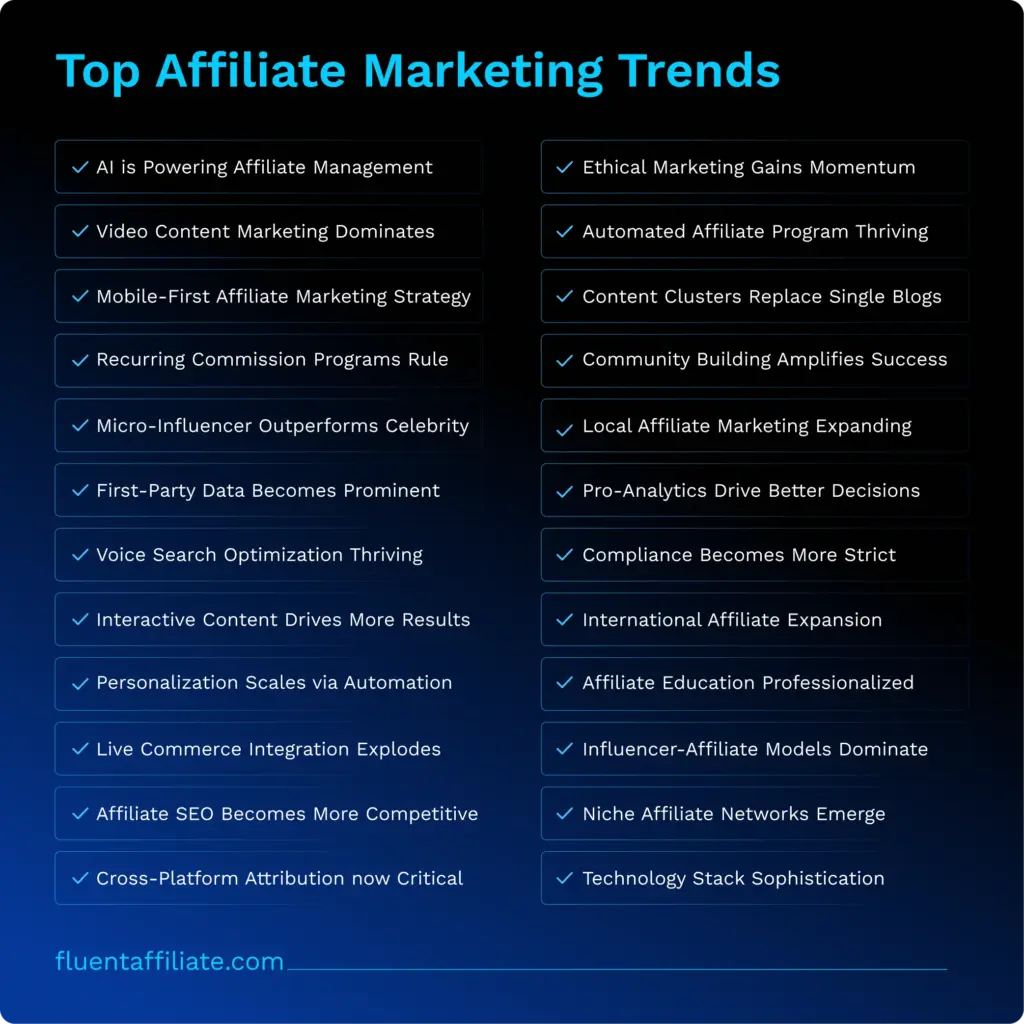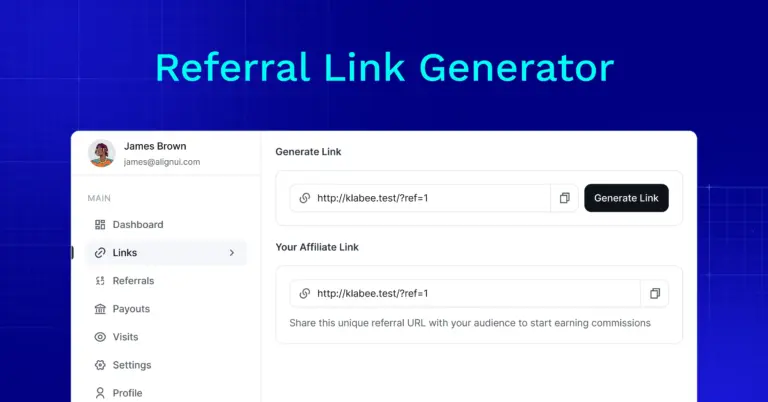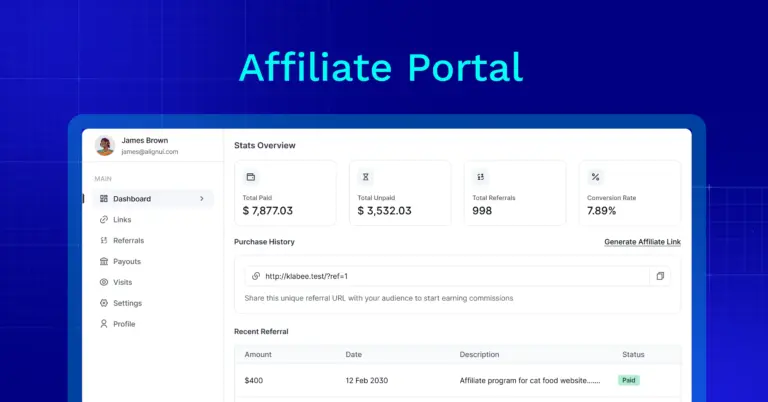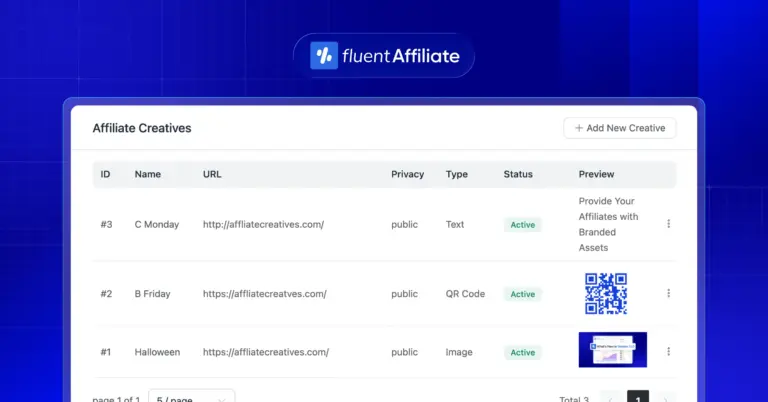25 Affiliate Marketing Trends [Latest Strategies & Statistics]
![25 Affiliate Marketing Trends [Latest Strategies & Statistics]](https://fluentaffiliate.com/wp-content/uploads/2025/09/Group-1538232031.webp)
Remember when affiliate marketing trends meant slapping banner ads on your blog and hoping for the best?
Those days are long gone.
Days ago, a fitness influencer made $12,000 in a single TikTok video selling workout gear through affiliate links. Meanwhile, a traditional product review site that used to pull in six figures? It’s barely breaking even after Google’s latest updates.
The affiliate marketing trends in 2025 aren’t just changing. They’re being completely rewritten.
If you’re running an online business, managing WordPress sites, or thinking about starting an affiliate program, you need to know what’s coming. Because the strategies that worked in 2023 might actually hurt you in 2025.
Let’s explore the 25 affiliate marketing trends that will separate winners from losers in 2025.
TL;DR
- AI-powered affiliate program management boosts conversions by 28%.
- Video content drives 82% higher affiliate conversions.
- Mobile-first strategy critical as 70% of purchases are mobile.
- Recurring commission programs yield 67% more revenue.
- Micro-influencers generate 60% higher conversion rates.
- First-party data collection becomes essential as cookies fade.
- Voice search optimization targets conversational keywords.
- Interactive content like quizzes increases engagement by 52.6%.
- Personalized automation improves conversions with dynamic content.
- Live commerce on TikTok/Instagram yields 30% higher conversions.
- SEO shifts to in-depth, experience-based content for rankings.
- Cross-platform attribution uses server-side tracking and promo codes.
- Ethical marketing boosts trust, with 73% paying more for sustainable products.
- Automation reduces affiliate program management time by 60%.
- Content clusters outperform single blog posts for rankings and sales.
- Community building on platforms like Discord fosters loyalty.
- Local affiliate opportunities grow in service-based niches.
- Advanced analytics track customer journeys and lifetime value.
- Stricter compliance with FTC, GDPR, and platform policies.
- International expansion adapts to local markets and currencies.
- Professional affiliate marketing education and certifications rise.
- Influencer-affiliate hybrid models blend authenticity with revenue.
- Niche-specific affiliate networks offer better support and matching.
- Customer experience optimization boosts post-click conversions.
- Sophisticated tech like AI and blockchain enhances tracking.
25 Affiliate Marketing Trends Thriving in 2025
Before we jump into the latest affiliate marketing trends, let’s talk reality. According to Cognitive Market Research, the global affiliate marketing industry hit $17 billion in 2023 and is racing toward $40 billion by 2030. That’s a 15.8% annual growth rate.
But here’s what most people miss: this growth isn’t evenly distributed. Some niches and affiliate marketing strategies are exploding while others are dying. The key is knowing which horse to bet on.

1. AI-Powered Affiliate Program Management Takes Center Stage
Artificial intelligence isn’t coming to affiliate marketing. It’s already here, and it’s changing everything.
The numbers: Scaleo’s report shows that 73% of affiliate networks now use AI for fraud detection, and conversion rates improved by an average of 28% when AI tools were implemented.
What’s happening:
- Smart link rotation based on visitor behavior
- Automated A/B testing of creative assets
- Predictive analytics for affiliate recruitment
- Real-time optimization of commission structures
A recent test of an AI-powered link optimizer showed remarkable results. It automatically switched between different product recommendations based on visitor data. The result? A 34% increase in earnings per click.
Action step: Start exploring AI tools like Jasper for content creation or Optimizely for automated testing. Don’t wait for competitors to gain the advantage.
2. Video Content Marketing Dominates Affiliate Conversions
Text-based reviews are becoming as outdated as flip phones. Video content now drives 82% higher conversion rates for affiliate campaigns, according to Wyzowl.
The shift:
- YouTube product reviews with embedded affiliate links
- Instagram Reels showcasing quick product demos
- TikTok unboxing videos with swipe-up links
- Live streaming product demonstrations
A beauty affiliate recently switched from written reviews to 60-second makeup tutorials on Instagram. Her monthly commission jumped from $800 to $4,200 in just three months.
Why video works:
- Builds trust through face-to-face connection
- Demonstrates products in action
- Higher engagement rates across all platforms
- Better mobile experience
Read more: Is Affiliate Marketing Worth It in 2025? [Data-Driven Prospects]
3. Mobile-First Affiliate Marketing Strategy Becomes Non-Negotiable
Here’s a stat that should wake you up: 70% of affiliate purchases now happen on mobile devices, but only 23% of affiliate sites are truly mobile-optimized.
The mobile reality:
- Page load speed under 3 seconds is critical
- One-tap purchasing options increase conversions by 67%
- Mobile-friendly affiliate link placement matters more than desktop
- Voice search optimization affects mobile affiliate discovery
According to SEMrush, the mobile-optimized page visits were 81% higher than desktop-focused ones. The writing was on the wall.
Quick mobile checklist:
- Test your site on actual mobile devices, not just browser tools
- Optimize images for faster loading
- Use larger, thumb-friendly buttons for affiliate links
- Implement accelerated mobile pages (AMP)
4. Recurring Commission Affiliate Programs Rule Revenue Growth
One-time commissions are yesterday’s news. Recurring affiliate programs are where smart marketers focus their energy.
The recurring revolution:
- SaaS tools offering 30-50% monthly recurring commissions
- Subscription box services with lifetime value tracking
- Online course platforms with tiered commission structures
- Membership sites with long-term partnership opportunities
Rewardful’s study found that affiliates promoting subscription services earn 67% more annually than those focused on one-time sales.
Top recurring niches:
- Software and digital tools
- Online education and courses
- Health and wellness subscriptions
- Entertainment streaming services
The math is simple: one customer worth $50 monthly for two years beats 24 separate $50 sales. Less work, more predictable income.
5. Micro-Influencer Affiliate Marketing Outperforms Celebrity Endorsements
Forget Kim Kardashian. The real affiliate gold is in micro-influencers with 10,000 to 100,000 followers.
The micro advantage:
- Higher engagement rates (7.2% vs 1.7% for mega-influencers)
- More affordable partnership costs
- Deeper audience trust and connection
- Better niche targeting capabilities
Influencer Marketing Hub’s report shows micro-influencers generate 60% higher conversion rates for affiliate campaigns.
Finding micro-influencers:
- Use tools like Upfluence or AspireIQ
- Search relevant hashtags on Instagram and TikTok
- Look for engaged communities, not just follower counts
- Partner with multiple micro-influencers instead of one celebrity
6. First-Party Data Becomes Your Competitive Edge
Third-party cookies are slowly dying. iOS privacy updates are limiting tracking. The affiliate marketers who thrive will be those who master first-party data collection.
First-party strategies:
- Email list building with lead magnets
- Quiz funnels that segment audiences
- Account creation incentives
- Progressive profiling techniques
Why it matters:
- Better attribution tracking
- Improved personalization capabilities
- Protection from platform changes
- Higher lifetime customer value
One affiliate marketer started building an email list six months ago using a free affiliate marketing checklist. That list now generates 40% of their total affiliate revenue, and it’s completely under their control.
7. Voice Search Optimization Changes Discovery
“Hey Google, what’s the best affiliate plugin for WordPress?” Voice searches like this are growing, and 62% of Americans use voice assistants, according to SEMrush.
Voice search impact:
- Longer, conversational keyword phrases
- Local intent becomes more important
- Featured snippets drive more traffic
- FAQ-style content performs better
Optimizing for voice:
- Target question-based keywords
- Create FAQ sections on product pages
- Focus on local SEO if relevant
- Optimize for position zero (featured snippets)
8. Interactive Content Drives Higher Engagement
Static content is boring. Interactive content gets 52.6% higher engagement than static content, says Forbes.
Interactive formats winning:
- Product comparison tools
- ROI calculators for business software
- Quiz funnels that recommend products
- Interactive product demos
A simple “Which WordPress plugin do you need?” quiz that recommends different tools based on user answers generates 3x more affiliate clicks than traditional blog posts.
Tools for interactive content:
- Fluent Forms for quizzes and surveys
- Outgrow for calculators and assessments
- Interact for personality quizzes
- Embedded comparison charts
9. Personalization Scales Through Automation
Generic recommendations are dead. Personalized affiliate suggestions based on user behavior convert better than generic ones.
Personalization tactics:
- Dynamic content based on referral source
- Behavioral email sequences
- Retargeting with specific product recommendations
- Location-based affiliate offers
Implementation ideas:
- Use tools like OptinMonster for behavior-triggered popups
- Set up email automation in FluentCRM or Mailchimp
- Create different landing pages for different traffic sources
- Implement exit-intent popups with personalized offers
10. Live Commerce Integration Explodes
Live streaming + affiliate marketing = the perfect storm. Platforms like TikTok Shop and Instagram Live Shopping are driving massive affiliate sales.
Live commerce numbers:
- 30% higher conversion rates than traditional affiliate content
- Average order values are 3x higher during live sessions
- Real-time interaction builds instant trust
Getting started with live affiliate marketing:
- Schedule weekly product demonstration sessions
- Engage viewers with live Q&A
- Offer exclusive discount codes during streams
- Use live polls to gauge interest in products
11. Affiliate SEO Strategy Becomes More Competitive in 2025
Google’s helpful content updates are shaking up affiliate SEO. Sites with thin, commercial-focused content are losing rankings fast.
What’s working now:
- In-depth, experience-based reviews
- Comparison articles with actual testing
- Problem-solving content that naturally includes affiliate links
- User-generated content and social proof
Affiliate marketing SEO strategies for 2025:
- Focus on search intent, not just affiliate marketing keywords
- Create comprehensive resource pages for digital marketing
- Build topical authority in specific affiliate niches
- Emphasize user experience metrics for better rankings
12. Cross-Platform Attribution Becomes Critical
Customers don’t buy in straight lines anymore. They see your Instagram post, research on Google, check reviews on YouTube, then buy on their phone three days later.
Attribution challenges:
- iOS 14.5+ limiting Facebook pixel tracking
- Cookie restrictions affecting cross-device tracking
- Multiple touchpoints before conversion
- Credit goes to the last click, missing the full journey
Solutions emerging:
- Server-side tracking implementation
- First-party data collection strategies
- Promo code attribution methods
- Customer survey integration
13. Sustainability and Ethical Marketing Gains Momentum
Consumers increasingly care about the companies they support. Affiliate marketers promoting sustainable, ethical brands see higher conversion rates and customer loyalty.
Trends in ethical affiliate marketing:
- Transparency about commission structures
- Promoting brands with sustainable practices
- Honest reviews, including negative aspects
- Supporting diverse and minority-owned businesses
Impact on conversions:
- 73% of consumers pay more for sustainable products
- Ethical brands have higher customer lifetime value
- Transparency increases trust and repeat purchases
14. Automated Affiliate Program Management Reduces Overhead
Managing affiliate programs manually is becoming impossible at scale. Automated systems are taking over routine tasks.
Automation areas for affiliate programs:
- Affiliate recruitment and onboarding processes
- Commission calculation and payment systems
- Performance tracking and detailed reporting
- Fraud detection and prevention measures
Read more: The Best Affiliate Management Plugin You Need for Business
Benefits of automation:
- 60% reduction in program management time
- More accurate tracking and reporting
- Faster affiliate payments
- Better fraud detection
15. Content Clusters Replace Individual Blog Posts
Single blog posts aren’t enough anymore. Content clusters that cover topics comprehensively rank better and convert more affiliate sales.
Content cluster strategy:
- Create pillar pages covering broad topics
- Support with detailed cluster pages
- Internal linking connects related content
- Establishes topical authority
Example cluster for “email marketing”:
- Pillar page: Complete guide to email marketing
- Cluster pages: Email automation, list building, subject lines, design templates
- Each cluster page naturally includes relevant affiliate recommendations
16. Community Building Amplifies Affiliate Success
Building a community around your affiliate content creates multiple touchpoints and higher lifetime values.
Community platforms:
- Facebook groups for niche discussions
- Discord servers for real-time interaction
- FluentCommunity for premium communities
- LinkedIn groups for B2B niches
Community affiliate strategies:
- Share exclusive deals with community members
- Get feedback on product recommendations
- User-generated content and testimonials
- Peer-to-peer product discussions
17. Local Affiliate Marketing Opportunities Expand
Not all affiliate marketing is global. Local affiliate opportunities are growing, especially in service-based industries.
Local affiliate niches:
- Home services and contractors
- Local software solutions
- Regional e-commerce stores
- Location-based subscription services
Local optimization tactics:
- Google My Business optimization
- Local keyword targeting
- Community event participation
- Regional partnership development
18. Advanced Analytics Drive Better Decisions
Basic click tracking isn’t enough. Advanced analytics tools provide deeper insights into affiliate performance.
Analytics evolution:
- Customer journey mapping
- Cohort analysis for long-term value
- Attribution modeling across channels
- Predictive analytics for trend identification
Key metrics to track:
- Customer lifetime value by traffic source
- Multi-touch attribution analysis
- Engagement depth before conversion
- Seasonal performance patterns
19. Affiliate Compliance Becomes More Strict
Regulations around affiliate marketing are tightening. Compliance isn’t optional anymore.
Compliance requirements:
- FTC disclosure requirements
- GDPR privacy regulations
- Platform-specific advertising policies
- Tax reporting obligations
Staying compliant:
- Clear affiliate link disclosures
- Privacy policy updates
- Regular policy review
- Legal consultation for complex programs
20. International Affiliate Expansion Opportunities
Global affiliate marketing opportunities are expanding as internet access grows worldwide.
International considerations:
- Currency conversion and payment methods
- Cultural differences in marketing approaches
- Language localization needs
- Legal requirements by country
Expansion strategies:
- Partner with local affiliates
- Translate high-performing content
- Research cultural preferences
- Use international payment processors
21. Affiliate Marketing Education Becomes Professionalized
The amateur hour is over. Professional affiliate marketing education and certification programs are emerging.
Education trends:
- Formal certification programs
- University courses in affiliate marketing
- Industry-specific training modules
- Continuous education requirements
Skills in demand:
- Data analysis and interpretation
- Content creation across multiple formats
- Technical implementation knowledge
- Compliance and legal understanding
22. Influencer-Affiliate Hybrid Models Dominate
The line between influencer marketing and affiliate marketing is blurring, creating powerful hybrid models.
Hybrid strategies:
- Influencers with long-term affiliate partnerships
- Affiliate bonuses for social media promotion
- Exclusive product access for top affiliates
- Content creation requirements for affiliates
Benefits of hybrid models:
- Stronger brand-affiliate relationships
- More authentic product recommendations
- Higher engagement rates
- Better long-term revenue stability
23. Niche-Specific Affiliate Networks Emerge
General affiliate networks are being challenged by specialized platforms focusing on specific industries.
Niche network advantages:
- Industry-specific tracking capabilities
- Specialized support and resources
- Better merchant-affiliate matching
- Industry expertise and connections
Growing niche networks:
- Software and SaaS focused networks
- Health and wellness specialized platforms
- Financial services affiliate programs
- Education and course marketplaces
24. Customer Experience Integration Affects Conversions
The affiliate link isn’t the end of the experience. Post-click experience heavily influences conversion rates.
Experience factors:
- Landing page load speed
- Mobile optimization quality
- Checkout process simplicity
- Customer support availability
Optimization strategies:
- Test landing pages before promoting
- Monitor conversion rates by traffic source
- Provide helpful pre-purchase information
- Follow up on abandoned carts
25. Affiliate Marketing Technology Stack Sophistication
The technology behind affiliate marketing is becoming more sophisticated, enabling better tracking, optimization, and management.
Technology trends:
- Advanced attribution modeling
- Real-time performance optimization
- Artificial intelligence integration
- Blockchain-based tracking systems
Essential tools for 2025:
- Multi-touch attribution platforms
- AI-powered content optimization
- Advanced fraud detection systems
- Comprehensive analytics dashboards
Closing Notes
Affiliate marketing trends in 2025 aren’t about luck or guesswork. They’re about understanding these digital marketing shifts and implementing them strategically in your affiliate programs.
Some of these affiliate marketing trends will generate revenue immediately. Others are investments in your future success. The key is knowing which affiliate marketing strategies to prioritize based on your audience, niche, and business goals.





Leave a Reply